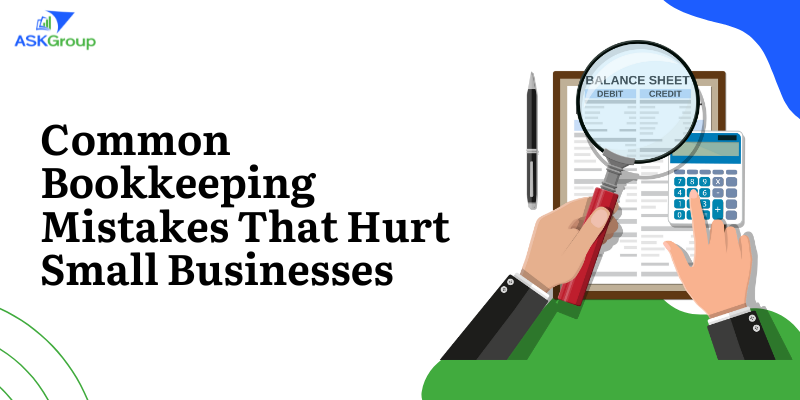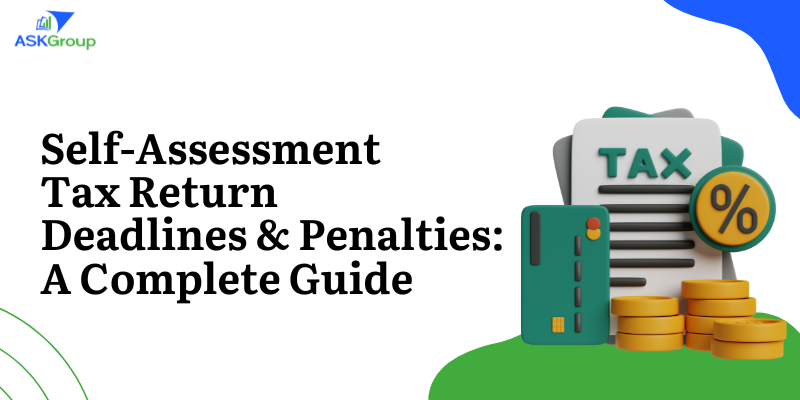
Table of Contents
Every small business in the UK is associated with numerous challenges, and bookkeeping is one of the factors that one cannot afford to mess up. Due to bad financial control, one can experience issues with cash flow, incorrect filings of taxes, and even lawful issues with HMRC. So as to prevent you from experiencing these errors, we have prepared a list of most common bookkeeping mistakes, which you should avoid to prevent the damage to your small business and the ways to repair them.
Introduction
Using the same bank account in executing personal and business transactions is one of the greatest mistakes that small business owners indulge in. This makes keeping track of spending, tax deductions and financial statement-preparation difficult. HMRC discourages mixing of personal and business money and if one mixes it, they may face audits or fine.
The most fruitful one would be to open a special account in a bank. It makes bookkeeping simple, proper tax reporting and it makes their financial transparency. This is a typical issue which can be easily solved due to the existence of free business accounts to startups offered by many UK banks.
Pinching Mistakes
1. Combining Entrepreneurial and Domestic Money
The UK law requires a business to retain financial records within a period of at least six years. Sadly, the owners of small businesses are the ones who fail to record the records well, this has led to the loss of receipts, absence of invoices and lack of completeness in the financial records. Lack of proper records can make you underreport income, overspend on expenses and be subject to HMRC investigation.
Record-keeping can be simplified by investing in accounting software such as Xero, QuickBooks or FreeAgent. These solutions enable you to scan the receipts, monitor spending into real time and build financial reports with a single touch. In case you are using manual bookkeeping, you should find some time every week to record your books and store your documents properly.
2. The Failure to Make Accurate Records
In the UK, VAT-registered companies will be required to make quarterly payments and returns based on Making Tax Digital (MTD). Late payments lead to fines, provision of interest, and possible downtimes in cash flow. There are also errors in VAT in some businesses, such as incorrect rate, costs including ineligible costs, or service reverse charge VAT is not accounted for.
To prevent VAT errors, you can apply to the MTD-compatible accounting software that will automatically calculate your VAT liabilities. Do not forget your deadlines by making some calendar reminders about them, and it would help in case VAT compliance seems too much, hire an accountant. Effective management of VAT will help you to be within the rules and not to suffer needless fines.
3. Lapse of VAT Deadlines
Transactions such as getting coffee to a client or paying parking fees to business meetings may not appear to be significant but they accumulate in the long run. These costs should not be overlooked by many business operators, as a brilliant tax deduction can be enjoyed because of them. However, any claims of legitimate business expenses can be made under HMRC as long as they are well documented.
Instead of leaving this task to chance, get used to recording all business expenses, no matter how minimal they are. Take some pictures of the receipt through a mobile application just after a sale. Analysis the expenses, which entails categorisation to ensure maximum tax relief without breaching any HMRC regulations.
4. Ignoring Small Expenses
Bank reconciliation also known as matching your books keeping through bank statements is important in reflecting errors, fraud or discrepancy. Reconciling the accounts may also be done at the end of a year by some businesses which may contribute to mistakes, overdrawn accounts, or false financial reporting being missed.
Purpose to reconcile monthly your accounts. This process can be automated using accounting software and they will be linked to your bank feed to identify any discrepancies and always keep your books current. The consistency associated with reconciliation enables you to identify any fraudulent transactions timely as well as keep proper records of the cash flow.
5. Failure to reconcile the bank statements on a regular basis
Cash flow management is the key to the survival of many small businesses and makes them fail not because of unprofitability. Unforeseeable costs, debt clients, and supply and demand can challenge the financial situation. Failure to conduct effective forecasting will expose you to difficulties when settling the suppliers, wages, or tax on time.
Make a cash flow model to forecast the future income and expenses of the next 6-12 months. To avoid common bookkeeping mistakes, the billing must be done timely, late payment plans should be pursued and an emergency fund to cover unseen expenses should be set. Instead, it is possible to use such tools as Float or Cashflow Manager to visualise cash flow trends and avoid financial shortfalls.
6. Neglecting Cash Flow Based Management
The employment status is strictly regulated in the UK, and employees that should work on payroll can be fined when labeled as self-employed. HMRC can decide that the truth of the matter is that a contractor is an employee and as such, their PAYE, the National Insurance up to the pension costs are backdated.
Before employment, do a check on the HMRC CEST (Check Employment Status for Tax) tool. When it is uncertain, seek the advice of an accountant to be certain of the provisions of the laws of IR35. This ensures that the right classification prevents the need to spend money on legal and tax problems later.
7. Improper Classifying of Employees and Contractors
The amount of tax payable often catches many small business accountants by surprise as they have not saved money during the year. Corporation taxes, income taxes and payments of VAT is one of the common bookkeeping mistakes and could cause the business to strain unless it is planned in advance.
Open a tax payment account and put some percentage of every invoice into the account. To better calculate liabilities using the HMRC tax calculators and preclude the surprise at the end of the year. Proactive strategy will allow making sure that you never run out of funds to meet tax deadlines.
8. Failure to Plan Taxes
Common bookkeeping mistakes can damage the financial wellness as well as compliance of your small business. These are some of the more common pitfalls to watch out for: maintaining good records, separating money, being up to date with VAT, and tax planning to ensure fewer hitches and an easier growth.
In the event that book keeping seems a chore, one can seek professional accounting services within ASK Group UK to provide customized services to small business owners. Check askgroupuk.com to get some professional help and follow your finances!

Ask Group
TOP CHARTERED ACCOUNTANT
Lorem Ipsum is simply dummy text of the printing and typesetting industry. Lorem Ipsum has been the industry's standard dummy text ever since the 1500s, when an unknown printer took a galley of type and scrambled it to make a type specimen book. It has survived not only five centuries, but also the leap into electronic typesetting, remaining essentially unchanged. It was popularised in the 1960s with the release of Letraset sheets containing Lorem Ipsum passages, and more recently with desktop publishing software like Aldus PageMaker including versions of Lorem Ipsum.
Categories
- Accounting (2)
- Book Keeping (1)
- Finance (1)
- Tax (1)
- VAT (1)




